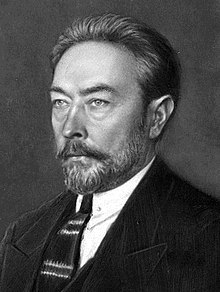Sergei Vasilyevich Lebedev
| Sergei Vasiljevich Lebedev | |
|---|---|

Sergei Vasilievich Lebedev
|
|
| Born |
July 25, 1874 Lublin, Congress Poland, then integrated in the Russian Empire |
| Died | May 1, 1934 (aged 59) Leningrad |
| Nationality | Russian |
| Institutions | Saint Petersburg Academy for Military Medicine |
| Alma mater | St. Petersburg University |
| Doctoral advisor | Alexei Yevgrafovich Favorskii |
Sergei Vasiljevich Lebedev (Russian: Серге́й Васи́льевич Ле́бедев; July 25, 1874 – May 1, 1934) was a Russian/Soviet chemist and the inventor of polybutadiene synthetic rubber, the first commercially viable and mass-produced type of synthetic rubber.
Lebedev was born in 1874 in Lublin and went to school in Warsaw. In 1900, he graduated from St. Petersburg University and found work at the Petersburg Margarine Factory.
Starting in 1902, Lebedev moved from university to university in Russia, starting at the Saint-Petersburg Institute for Railroad Engineering. In 1904, he returned to St. Petersburg University to work under Alexei Yevgrafovich Favorskii (Stalin Prize, 1941, for contributions to the manufacture of synthetic rubber).
In 1905, he married his second wife, the artist Anna Ostroumova-Lebedeva.
In 1915, Lebedev was appointed Professor at the Women's Pedagogical Institute in St. Petersburg. After 1916, he was a Professor of the Saint Petersburg Academy for Military Medicine. In 1925, he became the leader of the Oil Laboratory (after 1928, the Laboratory of Synthetic Resins) at St. Petersburg University.
He died in Leningrad and is interred in Tikhvin Cemetery.
Lebedev's main works are devoted to polymerisation of diene hydrocarbons. He was the first to research the polymerisation of butadiene (1910-1913). In 1910, Lebedev was the first to get synthetic rubber based on poly-butadiene. His book Research in polymerisation of by-ethylene hydrocarbons (1913) became the bible for studies of synthetic rubber.
...
Wikipedia
